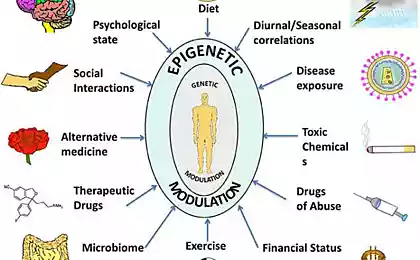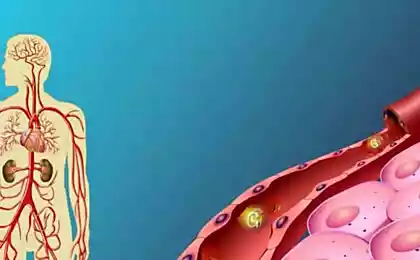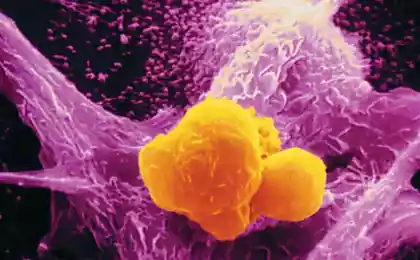439
Why the children and grandchildren of starving parents have diabetes
The negative effect of stress transmitted from parents to children, can be attributed to the work of epigenetic mechanisms, however, transmission of the same effect grandchildren epigenetic hypothesis is not explained.
Ninety four million five hundred ninety thousand five hundred sixty three
The effects of stress can be transmitted through several generations, this is indicated by a number of studies. One of the most famous examples is the increased predisposition to diabetes and obesity in children and grandchildren of Dutch women who survived the famous famine in the winter of 1944. On the other hand, animal experiments have shown that if the pregnant females to give some toxin or just to scare the males-fathers, chemical or mental stress will affect not only the parents themselves but also on their children's physiological or behavioral characteristics resulting from stress, goes by inheritance. However, no mutations does not occur here, the genetic code enclosed in the DNA does not change. This means that, in the case involving epigenetic mechanisms, which, without changing the sequence of nucleotides in DNA, modify them so that genes change activity.
Eleven million eight hundred fifty two thousand five hundred five
But what modifications to the DNA occur and how they are transmitted from generation to generation, biologists are still not entirely clear imagine. New riddles tossed here the work of Anne Ferguson-Smith (Anne Ferguson-Smith) and Mary-Elizabeth Patti (Mary-Elizabeth Patti). Together with colleagues from Cambridge, Harvard and University of Basel, they put the following experiment: were limited in the food of pregnant mice to identify in their offspring epigenetic changes that occurred due to starvation.
Epigenetic mechanisms there are several different types, and one of them is the attaching of methyl groups to nucleotides in DNA. Methylation alters the activity of genes, and it is in this case, it was the center of attention of researchers. During maturation of germ cells during prenatal development of the embryo such modifications disappear completely; we can say that the DNA of sperm and egg loses its epigenetic memory. But this process is not 100%, some of the methyl groups on the DNA still remain. In the experiment, the mice cut calories in the last week of pregnancy, at a time when maturing precursors of sperm cells in the embryo occurs the purification of DNA from epigenetic marks. Previous studies showed that under these conditions in offspring of the first and second generations increased the likelihood of diabetes.
Thirty nine million fifty eight thousand seven hundred one
It turned out that sons starved females of methyl groups on DNA of sperm was much less than that of the sons of normal females. Moreover, the differences were precisely those genes that are involved in the development of obesity and diabetes and who become more active than necessary.
The second generation of mice genes in tissues worked with the same variance, that is, starvation of grandmothers effect on their metabolism, too. However, as the authors work in Science, the differences in the epigenetic pattern in the second generation is missing, and here it was impossible for metilirovannah DNA to distinguish the descendants of the starved mice from the descendants of those that ate normally.
The results obtained largely clarify what we know about epigenetic mechanisms for the transfer of stress through the generations, but I must say, raise many questions. It seems that DNA methylation explains at best only half of the effect that we observed in the first generation. Grandchildren have epigenetic differences caused by the hunger disappear, but changes in the activity of genes is still present. It is possible that epigenetic mechanisms continue to work here, but the secrets yet to unravel.
However, some skeptics even question the appropriateness of such research. Animals used in experiments similar to those described above, always genetically indistinguishable from each other, i.e. represent the same net line. At the same time in nature this situation is even difficult to imagine – the genes of the parents will always be different. Epigenetic methyl pattern depends on the gene to which it is applied, so that when the mixing of different parental genomes in the embryo can be combination, predisposed bad epigenetic modifications. In this case, obviously, disturbances in the metabolism will be caused not so much by the fact that the mother during pregnancy was starving, how many features of the genetic combinations have a baby.
Source: nkj.ru
Ninety four million five hundred ninety thousand five hundred sixty three
The effects of stress can be transmitted through several generations, this is indicated by a number of studies. One of the most famous examples is the increased predisposition to diabetes and obesity in children and grandchildren of Dutch women who survived the famous famine in the winter of 1944. On the other hand, animal experiments have shown that if the pregnant females to give some toxin or just to scare the males-fathers, chemical or mental stress will affect not only the parents themselves but also on their children's physiological or behavioral characteristics resulting from stress, goes by inheritance. However, no mutations does not occur here, the genetic code enclosed in the DNA does not change. This means that, in the case involving epigenetic mechanisms, which, without changing the sequence of nucleotides in DNA, modify them so that genes change activity.
Eleven million eight hundred fifty two thousand five hundred five
But what modifications to the DNA occur and how they are transmitted from generation to generation, biologists are still not entirely clear imagine. New riddles tossed here the work of Anne Ferguson-Smith (Anne Ferguson-Smith) and Mary-Elizabeth Patti (Mary-Elizabeth Patti). Together with colleagues from Cambridge, Harvard and University of Basel, they put the following experiment: were limited in the food of pregnant mice to identify in their offspring epigenetic changes that occurred due to starvation.
Epigenetic mechanisms there are several different types, and one of them is the attaching of methyl groups to nucleotides in DNA. Methylation alters the activity of genes, and it is in this case, it was the center of attention of researchers. During maturation of germ cells during prenatal development of the embryo such modifications disappear completely; we can say that the DNA of sperm and egg loses its epigenetic memory. But this process is not 100%, some of the methyl groups on the DNA still remain. In the experiment, the mice cut calories in the last week of pregnancy, at a time when maturing precursors of sperm cells in the embryo occurs the purification of DNA from epigenetic marks. Previous studies showed that under these conditions in offspring of the first and second generations increased the likelihood of diabetes.
Thirty nine million fifty eight thousand seven hundred one
It turned out that sons starved females of methyl groups on DNA of sperm was much less than that of the sons of normal females. Moreover, the differences were precisely those genes that are involved in the development of obesity and diabetes and who become more active than necessary.
The second generation of mice genes in tissues worked with the same variance, that is, starvation of grandmothers effect on their metabolism, too. However, as the authors work in Science, the differences in the epigenetic pattern in the second generation is missing, and here it was impossible for metilirovannah DNA to distinguish the descendants of the starved mice from the descendants of those that ate normally.
The results obtained largely clarify what we know about epigenetic mechanisms for the transfer of stress through the generations, but I must say, raise many questions. It seems that DNA methylation explains at best only half of the effect that we observed in the first generation. Grandchildren have epigenetic differences caused by the hunger disappear, but changes in the activity of genes is still present. It is possible that epigenetic mechanisms continue to work here, but the secrets yet to unravel.
However, some skeptics even question the appropriateness of such research. Animals used in experiments similar to those described above, always genetically indistinguishable from each other, i.e. represent the same net line. At the same time in nature this situation is even difficult to imagine – the genes of the parents will always be different. Epigenetic methyl pattern depends on the gene to which it is applied, so that when the mixing of different parental genomes in the embryo can be combination, predisposed bad epigenetic modifications. In this case, obviously, disturbances in the metabolism will be caused not so much by the fact that the mother during pregnancy was starving, how many features of the genetic combinations have a baby.
Source: nkj.ru
Daddy's girl: educational feats and failures
26 charming gadgets that will turn your kitchen into a real zoo























